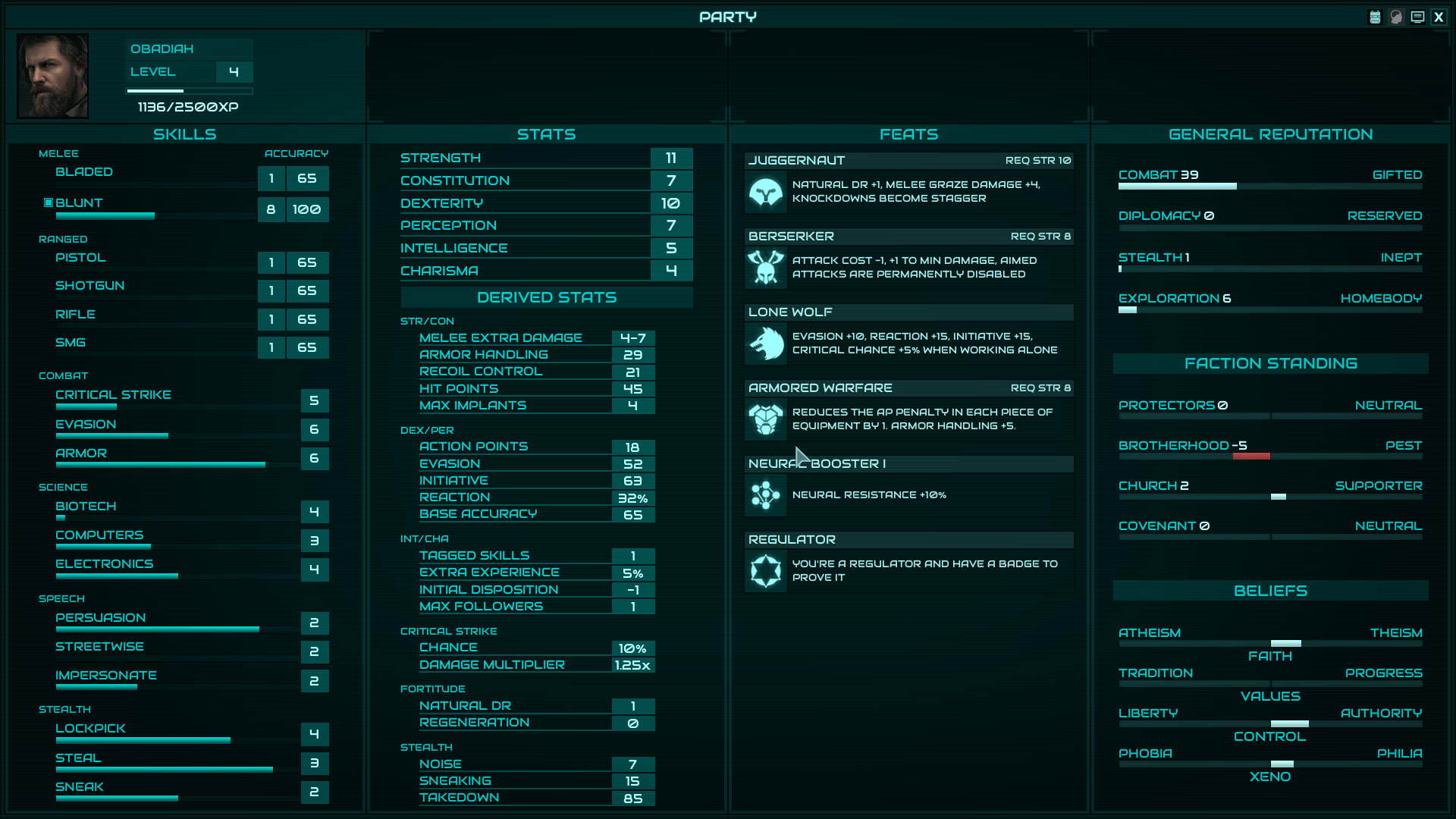Colony Ship opens with the musical strains of a melancholy western and a main menu that looks like the well-worn cover of a paperback space opera from the 1960s. The menu reveals the subtitle: "A Post Earth Role Playing Game." From the outset, Iron Tower Studio pays homage to its trinity of core inspirations: HBO's Deadwood, Heinlein's Orphans of the Sky, and Interplay's Fallout (which was subtitled "A Post Nuclear Role Playing Game"). If you enjoyed any of those works -- and especially if you enjoyed all of them -- the question is not whether you should play Colony Ship ("CSG") but when you should play.
CSG is a superb and unique game that I can recommend wholeheartedly even in its Early Access form. And since it is much cheaper now than it will be on release, this is the time to buy it. But since only the first portion of the game is currently available, and since even that portion will improve significantly through testing, you may want to buy now and play later if you prefer to prioritize your first experience with the game. If you can't resist diving in, or if you want to help shape and improve an already excellent RPG, there is no reason not to dive in now.
It's no spoiler to say that CSG is about a "generation ship" -- a slower-than-light vessel sent, lifetimes ago, from Earth to Proxima Centauri in hopes of establishing a colony at that nearest, yet still vastly distant, star. A generation ship rests on an unusual social compact. The first (Earthborn) generation chooses to make a tremendous sacrifice for sake of the last (colony-establishing) generation, who will have a chance at freedom and utopia in a new and unspoiled home. But the intervening Shipborn generations have no choice; enjoy no moral satisfaction at having made such a choice; and yet bear a sacrifice even greater than that of the founders. As the game's opening narration puts it: "You will never feel the sun's warmth under a blue sky, never hear the wind in the branches of a tree, and never swim in the ocean, because you had the misfortune to be born on the Ship. You have never seen Earth, and you'll never see Proxima Centauri either, your past and future both sacrificed by some dim and nameless ancestor to the greater good of the Mission."
For these middle generations, the Ship is neither Ark nor Mayflower; it is a prison and pressure-cooker. The game begins well after resentment and loss of faith have boiled over: a failed Mutiny has left every aspect of the Ship seriously damaged, not the least of which its social structure. Parts of the Ship have degenerated into post-apocalyptic ruin; parts into totalitarian dystopias; and parts into Wild West near-anarchy. Genetically engineered lifeforms meant to help colonize the promised land have gone haywire, unleashing a bestiary of Golden Age science fiction foes (giant man-eating frogs and starfish; hideously mutated humans; ever-spreading deadly fungi; etc.). Equipment meant to establish the new colony is being cannibalized to maintain a subsistence existence aboard the Ship. And enterprising souls are all too eager to arm the warring factions with both "ancient" high-tech weapons like lasers and plasma rifles and "modern" low-tech weapons like shivs, cudgels, and gunpowder firearms.
It's no longer a matter of living out one's life en route to Proxima Centauri; now it is a question whether one will survive at all and whether the Mission will even succeed. Very few still respect the past or plan for the future. Short-term thinking, with all its ferocity and freneticism, dominate the Ship.
In short: this is a bleak and fascinating setting that could come only from the developer of The Age of Decadence ("AOD"). To be sure, anyone familiar with classic science fiction, RPGs, or westerns will recognize dozens or hundreds of inspirations that have been neatly fitted together; but like a mosaic, the setting shines not only because of the bright pieces from which it is made, but because of the care and sophistication with which they have been assembled.
The player takes the barely defined role of a "scav" (a scavenger) eking out an existence in the Pit, a cargo hold converted into shantytown plainly inspired by Deadwood. It's a perfect starting hub that offers rich opportunities for any character build (a smooth talker with a knack for knives, a dumb-as-nails crackshot rifleman, a computer nerd with a body fit to bear many technological implants, etc.). In comparison with AOD, CSG is more lenient in terms of what builds feel viable -- if AOD pushed toward archetypes (and to some extent required metaknowledge for hybrids), CSG seems to expect players to mix-and-match skills, attributes, and feats to character a unique character. Character creation also cleverly weaves in the game's backstory.
Gaps in your abilities can be filled by companions. In another leap forward from AOD, there are memorable recruitable NPCs who can assist both inside and outside of battle. They have their own personalities and values, but CSG (thankfully) avoids the cRPG rut in which the player character serves as therapist and panderer to a coterie of needy basket cases. Your companions could get by just fine without you, but they -- like you -- don't object to having another pair of eyes to watch their back.
In the best tradition of cRPGs, you're soon launched on two main quests (one to obtain a valuable treasure, the other to pick sides in a conflict between two rival factions). But in pleasant contrast, these quests have no particular urgency. You aren't asked to avert the end of the world or prevent a demon from rising again. Your home isn't burnt to a cinder by marauders. Instead, these two quests serve as a means to push you into (and out of) the Pit, where you soon come across a variety of side quests, feuds, ancient machines, secrets, "dungeons," etc. You'll have to "make the best life you can and consign your what-ifs and might-have-beens to the void," as the intro puts it.
CSG is an very open game. You immediately have the run of the aforementioned hub, and you soon add two large "dungeons" (the Hydroponics Lab and the Armory) full of NPCs, foes, environmental interactions, traps, loot, etc. There's minimal hand-holding (perhaps to a fault), but because the game offers so many fun solutions, the feeling is less that of a drowning man and more that of a mosquito at the beach: so many places to bite. For those who like combat, there're plenty of challenging, systemically deep, tactical turn-based battles. For those who don't, there's a full-featured stealth system, rich diplomatic paths, and hacker options.
With strong writing, excellent quest design, and evocative graphics, the game gives a real sense of satisfaction when you put a bullet in a bully, con an implant off a rival scav, jury-rig a failing piece of technology, open up a new area, or learn new backstory. And the writing has a dark humor that makes even failure rewarding.
Obviously there's still a long way to go for CSG. But the developers have proven with AOD that they use Early Access in the best possible way. As the good book says, "Iron sharpens iron." Iron Tower pushes its players with challenging gameplay, but does not push them away. Negative and positive feedback alike helped AOD go from good to great, and such feedback should take CSG from a great game to a masterpiece.
I'll end where I started: I wholeheartedly recommend buying Colony Ship. Whether to play it now or later depends on your disposition. But either way, you should play it sometime. Iron Tower Studio has created that most special of indie games: one that exudes the heart and soul of a small team, while also boasting the depth of gameplay, quality of writing and design, slick graphics, and beautiful music of a large developer. Don't miss it.

























